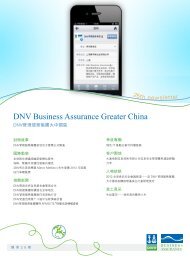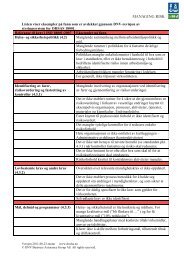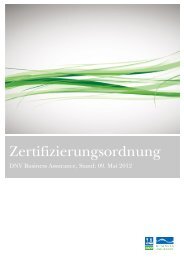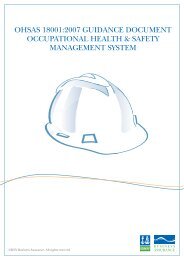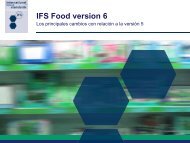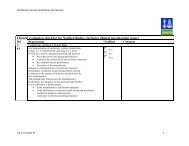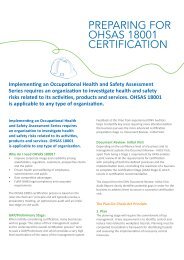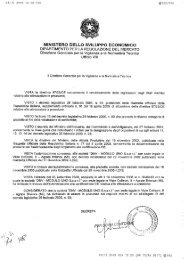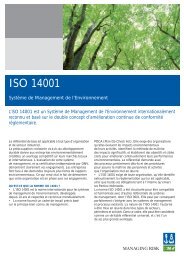Download - DNV Business Assurance
Download - DNV Business Assurance
Download - DNV Business Assurance
You also want an ePaper? Increase the reach of your titles
YUMPU automatically turns print PDFs into web optimized ePapers that Google loves.
I In 2009, Cool nrg successfully completed the pilot project Luz Verde (meaning ‘green light’) in partnership with<br />
the Mexican government in the Mexican district of Puebla. The project saw a million energy-efficient light bulbs<br />
distributed to poor households in less than one month.<br />
– ten times as much as Mexico receives in<br />
annual Official Development Aid from the<br />
US (its largest donor). Mr Frances believes<br />
treasury savings, as a direct result of the<br />
individual household savings, could even<br />
double that number.<br />
“Together with <strong>DNV</strong>, we have taken on<br />
huge risks to deliver something that has<br />
turned out to become real anti-poverty<br />
funded by the Mexican government and<br />
potentially part funded through CDM, and<br />
that is something we are very proud of.”<br />
THE FUTURE IS OPEN-SOURCED<br />
Cool nrg’s unique idea has attracted the<br />
South African Standard Bank to take<br />
an equity position in the company. Mr<br />
Frances hopes this will help the Mexico<br />
experience spread to African countries.<br />
“Developing countries are the places where<br />
CDM will be continuing, and for this to<br />
most likely happen there is by using<br />
PoAs,” he says. “Cool nrg obviously has<br />
some real skills in that, and we will happily<br />
take the job. But the most important<br />
thing is that these countries have access<br />
to the PoA in its own right.”<br />
While he is adamant that energy efficiency<br />
PoAs can benefit most developing<br />
countries, he says the problem arises when<br />
governments start off by looking for a<br />
carbon benefit.<br />
“It really is all about the strategy,” he<br />
says. “Let us first of all have a conversation<br />
about what’s the best strategy for energy<br />
efficiency in the country we go into, about<br />
how we meet our three commitments of<br />
CO2 reduction, creating energy security<br />
and reducing energy poverty. Then we<br />
need to work out how to manage the<br />
distribution, and ask how we are going to<br />
fund it. That is not a matter of creating<br />
carbon credits – it is a matter of making<br />
sure the energy efficiency is working. If it<br />
is, then we can start looking at whether all<br />
is in place to start generating carbon, and<br />
if that can partially or fully fund all the<br />
activity. Getting that order right is crucial.”<br />
While 20 years in the not-for-profit sector<br />
may have taught Nic Frances a thing or<br />
two about priorities, it has undeniably also<br />
equipped him with an insatiable appetite<br />
for social improvement.<br />
no 01 2012 – 49




